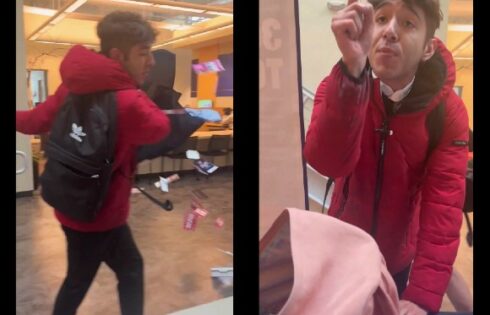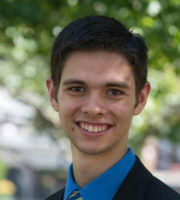
Panelist asked how their decision could affect litigation against university
Ordered by a federal judge to consider an appeal by a student it found responsible for sexual misconduct, George Washington University flouted its obligation by repeatedly mischaracterizing new evidence, according to an amended version of the student’s lawsuit.
“John Doe” also alleges that the private university allowed his accuser, student Gillian Chandler, to bring forward “more false allegations” that he had stalked her on Facebook. In order to allow this, GWU invented a procedure out of thin air, he claims.
U.S. District Judge Rosemary Collyer had previously faulted the official responsible for Title IX appeals for repeatedly using the wrong standard to judge appeals, violating GWU’s own rules.
She wouldn’t even let Robert Snyder, executive director of planning and outreach, consider Doe’s appeal again in light of his years of misreading his own duties. Instead, the judge sent the matter to an appeals panel.
GWU’s pool of panelists, however, showed that the university was again stacking the deck against Doe, he alleges.
A member of the pool who was eventually appointed also suggested the panel would be influenced by the potential “legal ramifications” of their decision on Doe’s lawsuit.
‘A copycat complaint’
Suspended for a year despite completing all the coursework for his degree, Doe has repeatedly questioned GWU’s reading of the evidence he provided in the case.
The university accused him of lying to Judge Collyer after it misread Chandler’s receipt from the Uber ride they took to Doe’s place. (Chandler voluntarily outed herself as Doe’s accuser after he sued GWU, and later publicly identified him as a rapist.)
GWU also tried to defend Snyder’s misreading of his duties by claiming that “viability” – the standard for appeals in its own code – means the same thing as “validity,” which Snyder testified he had been using all along.
Doe’s amended filing emphasizes that GWU took every opportunity to believe Chandler’s ever-shifting testimony despite her claimed alcohol consumption.
Doe’s toxicology expert had testified she wouldn’t be able to “stand, speak, remember anything from the entire evening,” including the many details she shared from before and after the sexual encounter, if she had as many drinks as quickly as she claimed.
MORE: GWU broke contract with Doe, Judge Collyer says
Doe had also claimed that Chandler wasn’t holding a drink when they met at a party. She told him about an Islam course she was taking, which he had previously taken: “They had a sustained conversation about complicated topics” that Chander “followed perfectly and contributed to.”
Faced with sustained pressure from the Obama administration and lawsuits from alleged sexual-assault victims – one of which was dismissed after Collyer’s August ruling – the university was determined to “appear tough at all costs on sexual assault,” Doe alleges.
The suit says the university’s Title IX office promotes the work of a sex educator, Laci Green, whose internet videos claim that sexual-assault reports are “nearly always true” and “distrust of women” is behind skepticism of rape claims (below).
It also claims that when Chandler formally accused Doe two years later, her complaint to GWU looked like “a copycat complaint made to track” a high-profile complaint made by another female student.
https://www.youtube.com/watch?v=NOJz0HKITLY
Roommate’s new testimony contradicts accuser’s claims
Doe had received call records from Chandler’s friend “E.E.” as part of the litigation. They showed that E.E. did not make or receive a phone call from Chandler while she was in the Uber with Doe, as E.E. had claimed. (Chandler didn’t mention this call in three different statements.)
E.E. was the only witness to claim that Chandler was not lucid enough to consent to sex after the party, based on their alleged phone call during the Uber ride. The suit claims she gave false testimony because E.E. was no longer a student, and therefore couldn’t be punished by GWU.
Chandler’s phone records also contradicted E.E.’s testimony because they show the only person Chandler called in the relevant time span was her roommate, “A.C.,” who refused to testify at the Title IX proceeding.
MORE: GWU accidentally exposes Chandler’s lie by misreading Uber receipt
Doe claims Chandler was calling A.C. to see if their shared room was available for sex with Doe. A.C.’s testimony to the university this June contradicted many of Chandler’s claims, including that Chandler told A.C. she had been raped after A.C. followed her into the bathroom, according to the suit.
A.C. had already left the party when E.E., who was still at the party, claims to have talked to Chandler: “There is thus no way that E.E. could have been involved in any way with that call.”
Chandler’s text messages, finally obtained by GWU when it was investigating Doe’s retaliation complaint, showed that she only told E.E. that she was raped more than two years later, and six weeks before the Title IX hearing.
E.E.’s shocked response showed that she was “being told something terrible for the first time,” not being reminded of it. She went from not remembering “anything specific” about that night, to providing “vivid details” about Chandler’s incoherence during the hearing.
George Washington U. dismissed new evidence in Title IX appeal, flouting court order, student says by The College Fix on Scribd
Rape-culture activist in the pool of appeals panelists
GWU showed bad faith after Collyer’s August ruling by rejecting Doe’s appeal and denying him a new hearing “in a decision that spanned less than a page and a half,” he says.
Before the appeal hearing, GWU allowed Chandler to respond to Doe’s appeal with “lengthy responses,” even though its code of student conduct does not provide “the right to respond.”
She accused him of harassing her by posting comments on her Facebook page, two of which she said were deleted before she could capture them. The first was allegedly “a long-winded comparison of the case with the storyline of To Kill a Mockingbird,” and the second, a photo of Doe “as a child.” She didn’t describe the photo or explain how she knew it was Doe.
The suit doesn’t say whether Chandler provided an image of the third alleged comment, a “painting of Salome holding John the Baptist’s Head.” She said this must have been Doe because they were both studying religion, but “did not explain why one has to minor in religion to know a story so familiar,” the suit says.
The university ignored Doe’s objection to these allegations, for which Chandler provided “no evidence connecting them to him.” They were included in the appeals hearing, but Doe wasn’t allowed to respond to them.
These “extra-Code procedures” let Chandler submit “entirely new, and completely unsubstantiated” claims, giving her “the last word on Mr. Doe’s appeal.”
MORE: GWU blocks Doe’s appeal after Chandler caught inventing evidence
The appeals process was fatally compromised because GWU knowingly allowed a biased student to participate in a pool of “potential panelists,” Doe claims:
… a GW undergraduate who holds a high-ranking position in an organization dedicated to “dismantl[ing] rape culture,” touts its “belie[f] in survivors,” and even sells clothing that says “Believe Survivors.” The potential panelist also tweeted frequently about issues related to sexual assault, all consistent with the views promoted by that organization.
Though the university granted Doe’s objection to this student sitting on his panel, it did not say whether it agreed with Doe’s concern, and it did not identify for him the panelists it had ultimately chosen.
One of those, another undergraduate student, emailed the director of student rights and responsibilities “and copied the other co-panelists” to ask how their decision could affect GWU legally, Doe claims.
The panelist said the appeals panel needed to know “how our decision could affect any current or future standing of the University in court against the respondent.” This person “ignored a specific instruction not to conduct outside research” on Doe’s case and “wanted to make sure that nothing the panel decided might hurt GW in court,” according to the suit.
The inclusion of these two students in the panelist pool shows GWU “failed adequately to select and train panelists to hear appeals in sexual misconduct cases.”
Though GWU disclosed the student panelist’s email to Doe and let him scrap the entire panel, it still didn’t tell him who would be on the next panel to consider his appeal.
Pool of (specially trained) TIX appeals panelists at @GWtweets includes official of org that sells "Believe Survivors" clothing & student who wanted briefing "on how our decision could affect any current or future standing of the University in court against the respondent." pic.twitter.com/xDJqiBHfhi
— KC Johnson (@kcjohnson9) October 1, 2018
‘You got her height and weight wrong’ (but it didn’t affect the toxicology report)
The letter rejecting his appeal “began with throat-clearing that was all but required” by Judge Collyer, recognizing that Chandler’s text messages and phone records, as well as the toxicology report, were “new, relevant, and not presented during the hearing.”
But in response to nearly 200 pages of Doe’s two appeals filings and exhibits, the university’s rejection letter was less than “a page and a half.”
It claimed the new evidence – including phone records that contradicted testimony – had not “significantly altered the finding of fact” because they showed that “a phone call occurred in the Uber ride”:
The panel, in other words, reasoned that, because the phone records showed that [Chandler] called A.C., who was not at the party, the records corroborated E.E.’s testimony that [Chandler] called E.E., who was at the party. That reasoning is so frivolous as to be disingenuous on its face.
The panel also claimed the records “directly contradicted” Doe’s testimony that “no phone call occurred during the ride,” when in fact the records show a one-minute call took place. This is how Chandler’s provider, Verizon, categorizes “all attempted calls … even if no one picks up,” and A.C. told the university she didn’t remember a phone call with Roe.
MORE: GWU promises to keep using low evidence standard for rape
The panel also misread the toxicology report in noting that Doe had inaccurately conveyed Chandler’s height and weight to his expert witness, Harry Milman, the suit claims.
Milman had given a range of intoxication, which even at the low end – corresponding to Chandler’s actual proportions – would have made it unlikely she could have remembered the evening, or run home from Doe’s building and coherently convey to her roommate she had been raped. The appeals panel simply told Doe: “You got her height and weight wrong.”
It went on to discount Doe’s new witness who had a “lucid” conversation with Chandler, because “Q.W.” – who was studying abroad at the time – submitted his testimony after the hearing.
The panel portrayed E.E. – who gave “provably false” testimony – as simply misremembering one detail, however. It also falsely claimed that A.C.’s testimony “generally corroborates” Chandler’s.
GW appeals panel then denies acc'd student's (court-ordered) appeal, dismissing exculpatory evidence w/arguments about the exculpatory phone messages startlingly reminiscent of GW's previous arguments on the matter in court. pic.twitter.com/x8mYc4Hkxi
— KC Johnson (@kcjohnson9) October 1, 2018
‘Insufficient evidence’ of accuser’s false testimony
It took four months for GWU to give Doe its response to his complaint that Chandler had named him on Facebook and called him a rapist, an act of retaliation banned by university rules.
Jennifer Alexander-Smith, associate director of the Office of Student Rights and Responsibilities, simply told him that Chandler’s action “did not violate university policy.” She said it was “uncertain” whether Chandler falsely claimed to have talked to E.E., despite the phone records Doe had obtained.
A day after Doe filed a “court-ordered second appeal,” the university turned over the investigative report documenting the hard evidence that contradicted the testimony of both Chandler and E.E.
But the university still insisted there was “insufficient evidence” to show that Chandler provided false testimony, in violation of university rules.
GWU media relations did not respond to a College Fix query last week on its response to Doe’s new allegations in the amended complaint. Doe’s attorney Justin Dillon declined to comment because the case is pending.
MORE: Title IX official can be personally liable for helping accuser lie
IMAGE: Bashigo/Shutterstock
Like The College Fix on Facebook / Follow us on Twitter






Please join the conversation about our stories on Facebook, Twitter, Instagram, Reddit, MeWe, Rumble, Gab, Minds and Gettr.